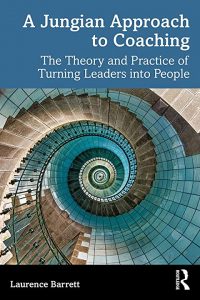Some thoughts from a Book Club: A Jungian Approach to Coaching by Laurence Barrett
Below are my thoughts and reflections. They are not necessarily those of the other book club participants or the author.

LEVEL 1
During the session we talked about Jungian Coaching and the extent to which it is useful and practical in organisational coaching and change.
Many businesses may have a navigation chart from A to B and they will use consulting and/or coaching to manage the people, process and technology change that is necessary to arrive at the destination.
Additionally, there may be a Change Team or Talent Academy or similar to up-skill and develop in-house competence, capacity, drive and desire for further change: perhaps business or process improvement or product-service innovation.
These things may be complex but they are not unusual and there are plenty of well established tools, templates and techniques to support transactional, transitional or transformational change.
Coaching in this context may be aligned to personal development of the participants or aligned to measurable outputs of the project(s) or outcomes of the programme.
LEVEL 2
The reality is organisations are seldom “logical” and indeed the mission, vision, values and culture may be more reflective of the hopes, dreams, fears and dramas of those within the business or stakeholders of it. Ostensibly people are the cells that make-up the organism or indeed the living organisms that are the culture.
Each person will have their own complex patterns, based upon nature and nurture, informed by experience and managed by the ego to present the right persona to the right people, at the right time, according to circumstances. This is entirely normal, it is the process of relationship within ourselves (who we are and want to be) and how we relate to others in pursuit of our, their and shared goals and purpose.
Our capacity to effect change may be compromised by these factors, and our appetite for “freedom” and change undermined by the desire for, or obligation to, familiarity and certainty.
I suspect Jungian Coaching might lead us toward this more complex, personal and sensitive stuff.
RECONCILING THE SCENARIOS
It may be reasonably argued that it is important to focus upon and address the issues at LEVEL 1. LEVEL 2 seems more like therapy than coaching and does not obviously sell more widgets or improve the performance metrics scrutinised by the stakeholders.
However, everyone is part of this complex adaptive system and focussing entirely on LEVEL 1 is like having a 26 week marathon training plan whilst ignoring diet, sleep, nutrition – the more organic elements and complex processes – that are the subject of LEVEL 2.
We all recognise the importance of culture, in our diet and our organisations, but the tendency appears to be a CBT approach to ‘managing’ the behaviours rather examining the patterns and beliefs. The emphasis seems usually toward productivity rather the individuation.
We therefore flip-flop between valuing mavericks and compliance, leadership and teamwork, style and substance, in an endless pursuit of the elusive sweet-spot that is the eye of a storm which is difficult to predict and impossible to maintain.
CONCLUSION
There is no conclusion, except to say that observation is interesting, and understanding is useful. I would welcome comment on books to read, videos to watch or experiences share from anyone who has been using Jungian Coaching in organisational change.
I recommend the book A Jungian Approach to Coaching by Laurence Barrett, and the associated Book Club.
